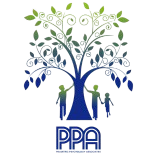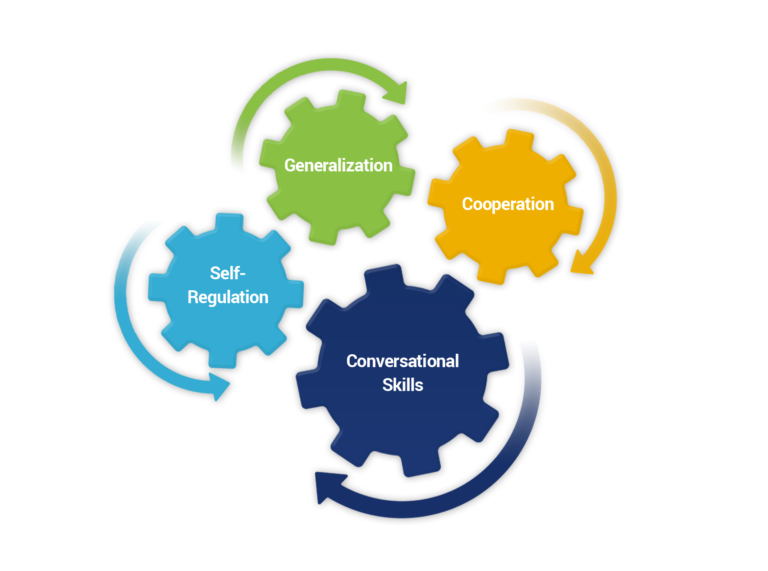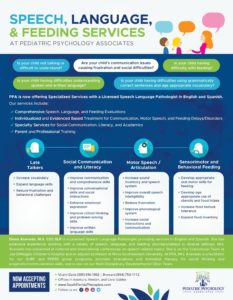 Call us
Call us
South Florida Community,
New York & Connecticut
(305) 936 - 1002
- Home
- MeetOur Team
- Services
- Adult Services Division
- Areas ofSpecialty
- Attention-Deficit/Hyperactivity Disorder (ADD/ADHD)
- Anxiety Disorders
- Autism Spectrum Disorders
- Behavioral Concerns
- Eating Disorders
- Family Related Issues
- Mood Disorders
- Obsessive-Compulsive Disorder (OCD)
- Psychological Factors Affecting General Medical Conditions
- School and Academic Issues
- Social Skills
- Trauma
- Forms &Payment Info
- Locations
- Contact Us
Why Should You Consider PPA for Speech Language Resources?
Collaborations between psychologists and speech language pathologists is essential in providing a holistic and comprehensive treatment approach to support children’s academic, social, emotional, and communication development. PPA is fortunate to have Diana Acevedo, M.S. CCC-SLP, a highly experienced bilingual Licensed Speech Language Pathologist, as part of our clinical team. Ms. Acevedo’s extensive professional training and flexible style allows her to work effectively with children, adolescents and adults experiencing speech/language difficulties. Her input and hands-on involvement during the process of comprehensive evaluations and social skills groups has been invaluable to growth and success of our patients.
How can PPA Help with Speech Language Pathology?
Evaluations for Speech Language Pathology
Speech-language pathology services at PPA include comprehensive diagnostic evaluations, consultations, parent coaching, and treatment of individuals with speech, language, social communication and/or feeding/swallowing disorders. We provide comprehensive evaluations that formally assess all areas of communication including speech articulation, language, pragmatic, and, when appropriate, feeding skills. We also provide assessments of specific areas of communication depending on the presenting concerns. Evaluations range from 1.5 to 3 hours.
Our speech language evaluations at PPA are comprehensive and if therapy is clinically indicated, the therapist will outline a plan of treatment for therapy services. If your child is in need of therapy services and you would like to access these services in the public school system through an IEP (Individualized Education Plan) or through your insurance company, a speech language evaluation must be comprehensive and completed by a licensed speech and language pathologist. Results will be provided in a report to be shared with your child's school and any other parties of your choosing.
Following an evaluation and determination of the problem, our speech-language pathologist develops an individualized plan of care. This may include a recommendation of individual therapy or group therapy. We consider family members to be an integral part of the treatment team. Therefore, family members are encouraged to observe sessions in order to learn how to provide support and additional practice at home. After each session, instructions for practice between sessions are given to the family.
| Evaluation Services | ||
| Comprehensive Evaluation – Full Speech Language
One visit of 3 hours with report |
$525.00 | |
| Specialty Evaluation – Specific to Articulation, Language, or Feeding One visit of 1.5 hour with report |
$325.00 | |
How Does Speech Language Therapy Help?
Treatment Options
Based on the evaluation results, an individualized treatment plan is developed to target specific difficulties. Therapy is usually provided individually. In some cases, however, group therapy may be most beneficial. The mode of therapy (individual or group) and the frequency of therapy are always determined by considering the specific needs of each person and family.
When working with children and others who may need support outside of therapy, we encourage caregivers to observe treatment sessions. We also give caregivers specific instructions on practice exercises to be conducted between sessions, as repeated practice leads to faster advancement in therapy. Regular therapy attendance is also important to achieve the most progress.
| Therapy Services* | |
| Individual Therapy-45 minutes | $160 |
| Parent Coaching -45 minutes | $160 |
| Group Therapy - 60 minutes | $90 |
*Some services can be provided via telehealth if deemed appropriate
What Speech Language Conditions/Concerns Does PPA Treat?
Speech-Language Therapy helps children and adolescents develop their abilities in:
- Play and Interaction:playing, looking, listening and attending to others in order to interact appropriately and develop/maintain relationships
- Understanding Words and Language: understanding language concepts, grammatical rules, and storytelling in order to answer questions and follow instructions
- Using Words and Language: formulating sentences with appropriate grammar, sharing and telling stories, using language socially to engage with others
- Pronunciation and Talking:appropriate use of oral articulators to be able to link sounds to form words and sentences in order to be understood by all
A few Speech Language related concerns that are evaluated and treated at PPA:
- When a child is having difficulty producing and using age-appropriate speech sounds, this is known as Articulation (Speech) Disorder. Symptoms include incorrectly producing speech sounds (phonemes) due to imprecise placement, timing, pressure, speed, or flow of movement of the lips, tongue, or throat. This results in limited intelligibility of speech.
- A more commonly diagnosed concern is stuttering or dysfluency. Dysfluent speech is characterized by the disruptions in normal speech flow. Speech is often halted and can include repetitions (“My, my, my, dog Bailey”), fillers (“Um”) and prolongation of speech sounds (H-h-h-h-h-h-is shoes are under the sofa). In severe cases, secondary physical characteristics may be observed, such as laryngeal tension, eye blinking, or foot stomping.
- Expressive Language Disorders are characterized by difficulty expressing thoughts and ideas, though understanding of spoken communication is not disrupted. Problems with expressive language may be manifested as short sentence length, poor story recall, improper sentence structure, poor word choice, difficulty retrieving words and poor use of grammatical rules.
- Receptive Language Disorder refers to difficulty understanding language concepts. This can result in problems understanding verbal instructions, grammatical rules, and details of a story. The disorder can also contribute to deficits in reading comprehension during academic work, as well as attention concerns.
- Executive Functioning (EF) Deficits affecting language/communication: Individuals who display limitations in EF often also struggle with various aspects of language and communication, such as phonological discrimination, lexical and grammatical production/comprehension and narrative production skills. In such cases, speech/language services integrate executive functioning support (in skills such as organizing, planning, directing attention, problem-solving and managing emotions) within the treatment plan. By addressing executive functioning skills within these services individuals improve their academic/work performance, social relationships and generalization of improved communication skills.
- Pragmatic/Social Skills Disorders affect the ability to understand how language is used in social contexts. In other words, the ability to functionally use vocabulary and respond appropriately to social interactions is disrupted in these cases. Some examples of challenges in social/pragmatic communication include difficulties initiating and maintaining conversations, understanding non-verbal cues and emotions, as well as considering and interpreting other’s communication intent and behaviors.
- As a graduate of the Intensive Social Thinking Clinical Training Program, Diana Acevedo, M.S. CCC-SLP implements the Social Thinking methodology when addressing concerns regarding pragmatic language and social communication/competencies that present in individual treatment.
- In addition to individual therapy treatment, in some cases, providing interventions in group format is recommended, as this allows for teaching and practice of skills and their application in vivo. PPA’s Social Understanding & Relationship Fundamentals (SURF) Groups work on a number of social and communication skills needed for social success. Groups are provided throughout the school year and during the summer as an abridged, intensive program. Learn more about social skills groups and registration. Details and registration for our summer camps.
- Abnormalities in voice pitch, loudness, quality or resonance affecting speech intelligibility and effective communication skills are categorized as Voice Disorders. These difficulties can also be helped with therapy.
- Difficulties with normal feeding or swallowing impacting the ability to eat a variety of age appropriate foods and use age appropriate utensils is characteristic of Feeding or Swallowing Disorders (Dysphagia).
- Some individuals may not suffer from a specific speech or language disorders, but may experience challenges (or may want to enhance their skills) in Public Speaking and Presentation Skills. Our public speaking coaching interventions aim at developing the ability to communicate in a manner that conveys competence, confidence, and comfort, whether in front of a large crowd, small group of people, or during interviews.








